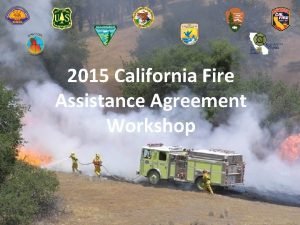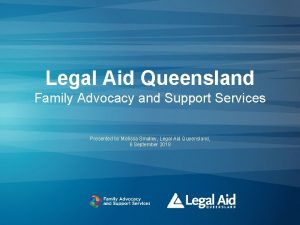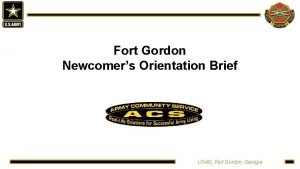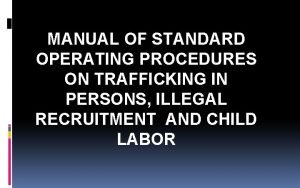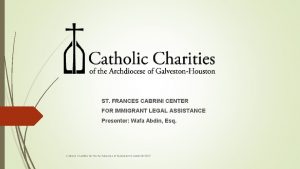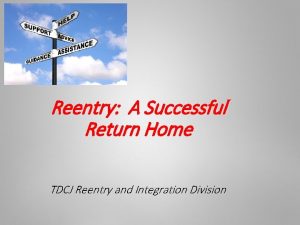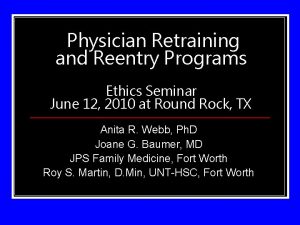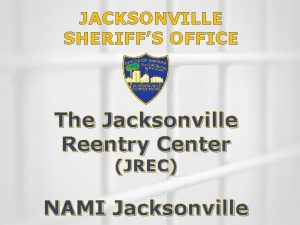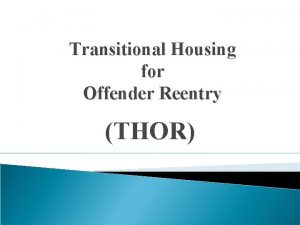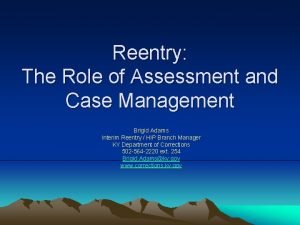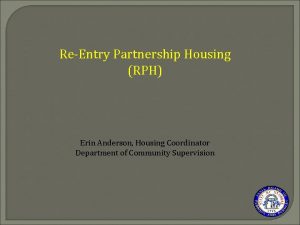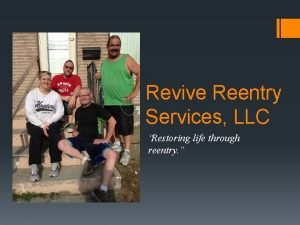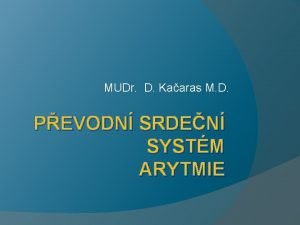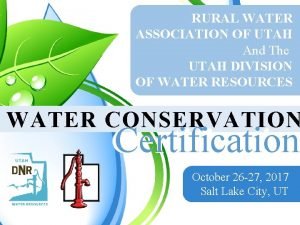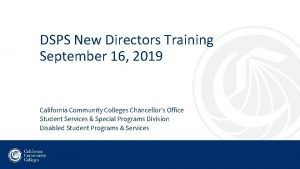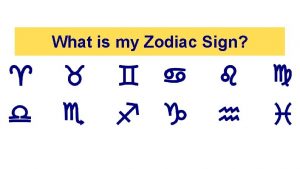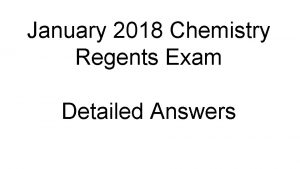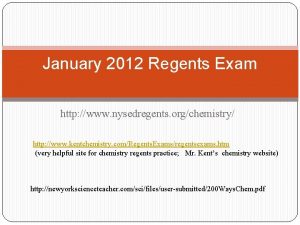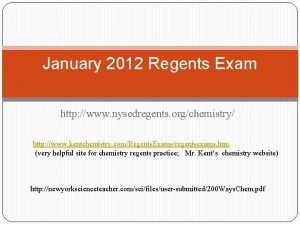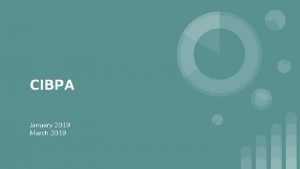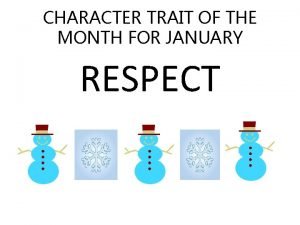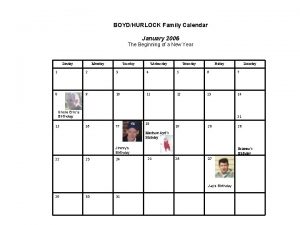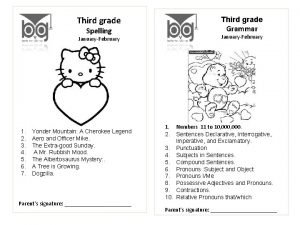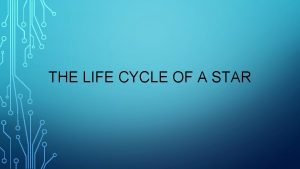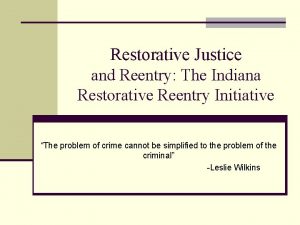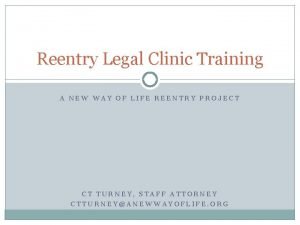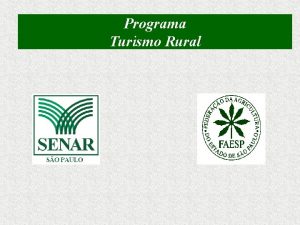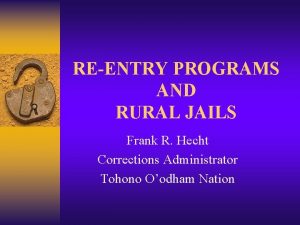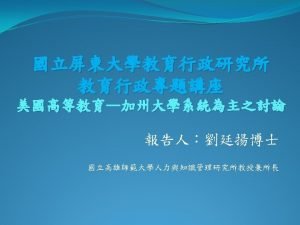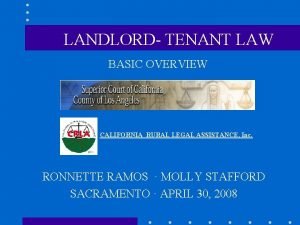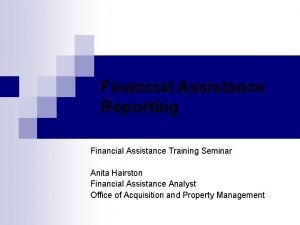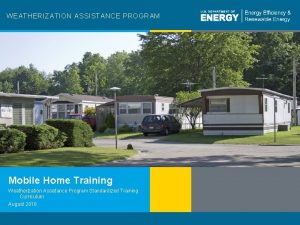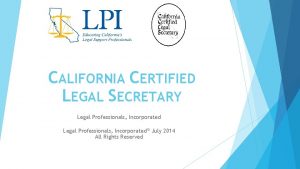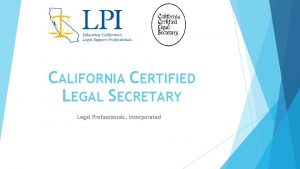CALIFORNIA RURAL LEGAL ASSISTANCE Reentry Training January 14


































- Slides: 34

CALIFORNIA RURAL LEGAL ASSISTANCE Reentry Training January 14, 2020

CRLA Disclaimer This presentation provides a general overview of information only. It does not constitute legal advice, but rather legal information. No attorney-client relationship is created by using any information in this guide. Laws frequently change and are subject to differing interpretations. If you use this information, it is your responsibility to make sure that the law has not changed and still applies to your specific situation.

Source Material http: //www. rootandrebound. org/guides-toolkits/

What Is Expungement? • An expungement is when the court orders a conviction to be set aside, a plea of not guilty to be entered, and the complaint to be dismissed. • There are specific requirements a person must satisfy to be eligible for expungement.

THE FIRST STEP… Obtaining Your Client’s Criminal Record • Charges from local county: Copies of case summaries from Courthouse that show ultimate disposition of case and any possible violations of probation (“VOPs”) • Charges from out of county: Obtain RAP sheet (Record of Arrest and Prosecution) from a Live Scan operator ($25 DOJ fee, plus Live Scan fee of about $15, unless fee waiver). BCIA 8690 – Fee Waiver; BCIA 8016 R - Regular

DOJ Fee Waiver Form – BCIA 8690

Record of Arrest and Prosecution (RAP) Sheet COMMON ABBREVIATIONS: • ARR/DET/CITE = Arrest/Detention/Citation • CJ = County Jail • CJS = County Jail Sentence • CNT = Count * CONV = Conviction • DISP or DISPO = Disposition of Charge • FOJ = Furtherance of Justice

RAP Sheet Info. For Expungement Petition 1. 2. 3. 4. 5. 6. Name and date of birth of defendant Location of court of conviction Case number Date and charge of conviction Sentence for conviction If sentenced to probation, were all terms and conditions satisfied? If unsure, then use “interest of justice” option (discretionary).

What Convictions Can Be Expunged? 1. Person is not currently on probation, parole, or serving a sentence; 2. Person has satisfied probation terms - paid all fines, fees, and completed all required classes; 3. Person is not currently charged with any offenses; *If the above requirements are met, expungement is MANDATORY!

Most Common Remedies • PC 1203. 4 dismissal – Felony or misdemeanor with probation granted; also early termination of probation. • PC 1203. 4 a dismissal – Misdemeanor or infraction – no probation; when no other crimes committed after offense. • PC 1203. 41 dismissal – Felony county jail sentence (Realignment AB 109, passed in 2011). Certain less serious felonies served in county jail instead of state prison. • PC 1203. 42 Dismissal (always discretionary) – Sentenced to prison, pre 10/1/11 – pre Realignment/AB 109 – for a crime otherwise eligible for felony county jail sentence. Look for Prop. 47 remedy first.

Most Common Remedies Continued • PC 1203. 43 – Erases a prior DEJ “deferred entry of judgment” as a drug “conviction; ” (for immigration purposes, a plea withdrawn is considered “legally invalid”) • PC 17(b) – Felony reduction to misdemeanor • Prop 47 – Certain felonies re-classified as misdemeanors • Prop 64 – Certain felony marijuana offenses are now misdemeanors

Status of Client - Still On Probation • Is client still on probation? • Determine if informal (bench) or formal (supervised). • Analyze whether the person can be terminated early. • Finished half of time? (e. g. 2 out of 4 years) • Complied with all terms? (completed classes, paid fines, or current on payments) • Not currently charged with a crime? • File motion to terminate probation early; use “interest of justice” option (PC 1203. 4)

Felony Reduction to a Misdemeanor PC 17(b) • If client has a felony, it may be eligible for a reduction to a misdemeanor if: • Client was convicted of a wobbler offense (chargeable as F or M – penalty included up to 1 year county jail or longer sentence in state prison) • The punishment calls for a sentence of county jail or imprisonment under Realignment (split sentencing) • Reductions are discretionary, meaning a Declaration and letters of support should be submitted with the motion. • May be used to restore gun rights.

Prop. 47 • On November 4, 2014, the voters of California passed Proposition 47, a law that changes some low level (non-violent) crimes like drug possession and petty-theft related offenses from potential felonies to misdemeanors. The currently incarcerated may petition to be resentenced. • Prop. 47 is retroactive, which means it also applies to past convictions. So past felony convictions can be re-classified as misdemeanors. Disclaimer: Cannot have certain disqualifying priors such as sex crimes, serious or violent crimes convictions.

Eligible Prop. 47 Offenses • Second Degree Burglary – PC 459 (if underlying facts can meet the definition of shoplifting now listed in Cal. Penal Code section 459. 5) • Forgery—PC 470, 471, 472, 475 – does not apply if also I. D. theft • Forgery, writing bad checks— PC 476 a – less than $950 • Grand Theft—PC 487 – (PC 490. 2 no more analysis of value, type, manner, just less than $950) • Receiving Stolen Property— PC 496(a) – under $950 • Petty Theft with a Prior— PC section 666 – now, no limit (before, 3 priors) • Simple Drug Possession—H&S 11350, 11357, 11377 – enough for use – illegal drugs like cocaine, heroine, marijuana/concentrated cannabis, meth.

Prop. 47 Continued • If Prop. 47 petition is successful, and a felony has been reclassified as a misdemeanor, the next step is to prepare the 1203. 4 (et seq. ) petition to expunge. Even if a person served a prison term for the former Prop. 47 felony. (1203. 4 a – custody time, no probation) • May require a court hearing • If Prop. 47 petition is successful, it reduces to a misdemeanor for all purposes EXCEPT for restoring gun rights.

Prop. 64 legalizes the possession, transport, purchase, consumption and sharing of up to one ounce of marijuana and up to eight grams of marijuana concentrates for adults aged 21 and older. Adults may also grow up to six plants at home. It reduces or eliminates criminal penalties for most marijuana offenses for adults and juveniles. REQUIREMENTS: 1. A completed sentence (no longer in custody and/or supervision) 2. Can apply for Prop. 64 regardless of what else is on your record Judicial Council forms (CR-400) are now available.

What Cannot Be Expunged? • Any conviction where a prison term was served (but Prop. 47 exc. ); • Any infraction under CVC 42001 (violations of any local ordinance, minor traffic tickets, pedestrian and bicycle offenses); • Any misdemeanor under CVC 42002. 1 (failing to stop and submit to vehicle inspection, refusing to comply with orders from LEO or FF, unsafe condition that endangers a person); • Any conviction (felony or misdemeanor) under PC 286 c, 288 a(c), 288. 5 289 j, 311. 1, 311. 2, 311. 3, 311. 11; or felony conviction under PC 261. 5(d).

What an Expungement Will NOT Do • It will not prevent use as a “prior” conviction in a future criminal case; • It will not stop your client’s obligation to report a conviction to occupational licensing agencies and on applications for job positions in a government office; • It will not restore the right to hold a job in public government office, if lost due to conviction; • It will not restore gun rights, can still be charged under “felon in possession” in a new criminal case; (except 17(b) reduction) • It will not seal or erase conviction from your client’s RAP sheet; case file from courthouse is public; • It will not provide relief from requirement to register as a sex offender under PC 290.

The Paperwork for Dismissals • PDF fillable forms – Available at www. courts. ca. gov • FYI – The Public Defender can do this work as well • CR-180 – Petition for Dismissal (also includes felony reduction to misdemeanor, but see local rules) (new form for 2019) • CR-181 – Order for Dismissal (new form for 2019) • Felonies – Proof of Service for District Attorney • Petitions are either mandatorily or discretionarily granted by the judge. Felonies usually require a hearing; misdemeanors do not.

Discretionary Dismissals • Discretionary – Either certain code section or probation has not been complied with (i. e. , nonpayment of fines, did not complete a class, did not obey all laws while on probation) • Certain convictions are always discretionary – for example, PC 191. 5(b) negligent vehicular manslaughter; PC 192(c) vehicular manslaughter; certain vehicle codes: VC 23152 (DUI) • Certain supporting documentation is required to support why “in the interests of justice” the Petition should get granted. In addition to completing CR-180 and CR-181, attach a declaration and letters of recommendation (3).

Sample of Declaration Be sure to include: • How have they changed? • What are they doing now to be productive members of society? • How is this conviction holding them back?

Letters of Support – What to Include • Letters from counselor, employer, teacher, pastor, etc. • Describe how supporter knows petitioner, how long, etc. • Explanation of why petitioner deserves expungement, i. e. , knowledge of goals, what petitioner is seeking to achieve • How has petitioner changed or who he/she is as a person • Give examples of good character, ways petitioner has contributed to society (work, volunteer, parent, education, etc. )

Immigration Issues (Padilla vs. Kentucky) • Must consider whether expungement will subject an individual to immigration consequences. Up to individual and his/her criminal defense attorney. • Previously mentioned PC 1203. 43 relief, where “guilty” or “no contest” plea entered in drug-related conviction is withdrawn and has no immigration consequences. In a deferred entry of judgment case (enter plea, do 18 months of drug treatment, dismissal after successful completion) • Motion to vacate under PC 1473. 7 – Vacate conviction if it is shown that legal counsel failed to advise of and defend against the adverse immigration consequences of entering a plea to a charge.

Criminal Arrest Record Sealing – PC 851. 91 • The Care Act – January 1, 2018 (SB 393) • New eligibility grants record sealing “as a matter of right. ” Arrest is deemed not to have occurred. • A person is eligible for relief if his/her arrest did not result in a conviction and the prosecution does not have the capabilities of charging, meaning: 1. The statute of limitations has run and the prosecutor is barred from filing charges; or 2. Charges were filed, but they were dismissed and cannot be refiled; or 3. Person was found not guilty by a judge or jury.

If Court Hearing Necessary, What to Expect • If probation made a recommendation, the judge’s clerk will have copies of it. Approach the clerk and ask for the copy. Review. • Determine who the district attorney is and consult with him/her as to his/her position. Sometimes the DA will lodge an objection. Do not lose heart! • Call the case and advocate for the petition filed, i. e. , employment/housing needs, accomplishments. • Clerk’s office should provide a certified copy of judge’s order, if approved. Keep as proof of mitigation in case the DOJ does not timely process the update of the RAP sheet.

Judge Considers Following Factors: • Any hardship caused by arrest • Declarations or evidence regarding good moral character • Declarations or evidence regarding and surrounding arrest • Prior criminal record or subsequent record? EFFECT: Local Criminal History Summary – court records are sealed, and illegal to disseminate; DOJ RAP sheet will state, “arrest relief granted. ” It will be illegal for LEO to disseminate the arrest information to any private entity. But, records are not destroyed.

Housing and Expungement • Private landlords – Expunged convictions do not show up on tenant screening background reports. • Public Housing (Criminal Activity) – Housing Authorities can see expunged convictions, but expungement is considered a mitigating circumstance. • Be aware of the “non-negotiables” in criminal history: Methamphetamine production on federally-assisted property; sex offenses requiring lifetime registration; past eviction from federallyassisted property due to drug-related criminal activity (3 year mandatory ban); and current drug use

Employment and Expungement - Ban the Box • AB 1008 went into law January 1, 2018. • It adds section 12952 to the Government Code – the Fair Employment and Housing Act (FEHA) – and repeals section 432. 9 of the Labor Code. These new provisions will make it illegal for any employer with five or more employees to: • Include any questions about criminal history on job applications. • Ask about or take into account someone’s criminal history before making a conditional job offer. • Consider prior arrests or enrollment in a diversion program such as a deferred judgment. • Consider any cases that were dismissed at the time of sentence or later through expungement.

Ban the Box Continued • Once an employer decides that an applicant is qualified for the position and makes an offer, the employer can look into applicant’s criminal history (NOTE: expunged convictions are not supposed to show up on background screening reports. ) • When the background check returns records of a criminal conviction, the employer cannot reject on this basis alone. Instead, the employer must assess how the criminal history might directly impact the ability to perform the job function. In deciding whether to hire, the employer must consider: • The type and seriousness of the offense • How long it has been since the offense and completion of the sentence • The responsibilities entailed by the new job

Senate Bill 1412 – January 2019 • SB 1412 – Amends Section 432. 7 of the California Labor Code • Only certain background information of ex-convicts will be searchable for employment. • The measure stipulates that employers (both public agencies and private) conducting criminal background checks on job applicants may only ask about convictions that are relevant to the job for which a prospective employee is applying. • No more “fishing expeditions. ” However, employers can see expunged or sealed convictions within the “particular convictions” category.

“Clean Slate” Record Relief AB 1076 • On October 8, 2019, Governor Newsom signed into law AB 1076. • The law authorizes automatic record relief in the form of set-aside or sealing for individuals with certain convictions and arrests. • It supplements the existing system of petition-based relief. • It applies to convictions and arrests occurring after January 1, 2021. • Eligibility is similar to existing law. • California is now the 3 rd state to adopt “clean slate” record relief, Pennsylvania (2018) Utah (2019).

Dismissals: No limits • You can petition for a dismissal as many times as you want. If you get denied, petition again. You may have to show continued efforts.

Questions? ? ?
 California fire assistance agreement
California fire assistance agreement Legal aid caboolture
Legal aid caboolture Fort gordon mwr masters tickets
Fort gordon mwr masters tickets Poea legal assistance
Poea legal assistance Catholic charities immigration houston
Catholic charities immigration houston Tdcj reentry program
Tdcj reentry program Physician reentry programs
Physician reentry programs Jrec jacksonville
Jrec jacksonville Thor approved rehabs in ga
Thor approved rehabs in ga +reentry +case +management
+reentry +case +management Reentry partnership housing
Reentry partnership housing Grizzly energy, llc
Grizzly energy, llc Idioventrikulární rytmus
Idioventrikulární rytmus Casualty assistance officer
Casualty assistance officer Rural water of utah
Rural water of utah California lti training
California lti training January 27 1756
January 27 1756 Zodiac for january 20
Zodiac for january 20 Isaac newton
Isaac newton January february march season
January february march season January february maruary
January february maruary June 2018 chemistry regents
June 2018 chemistry regents Kent chemistry reference table
Kent chemistry reference table January 2012 chemistry regents
January 2012 chemistry regents Life of a plant by risa jordan
Life of a plant by risa jordan Ib boundaries 2019
Ib boundaries 2019 January character trait
January character trait April 2006 calendar
April 2006 calendar January 27, 1756
January 27, 1756 Was born in salzburg austria on january 27 1756
Was born in salzburg austria on january 27 1756 January february spelling
January february spelling What is the theme for the month of january
What is the theme for the month of january 1995 january 23 nasa
1995 january 23 nasa January 24th 1848
January 24th 1848 William lloyd garrison jr 1934
William lloyd garrison jr 1934
